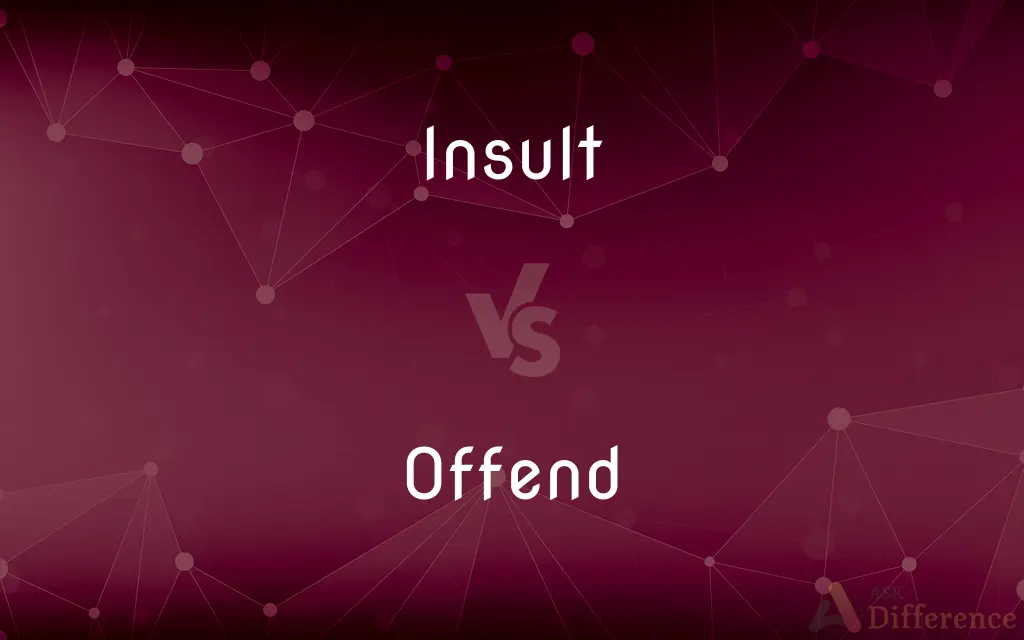Insult vs. Offend — What's the Difference?
By Tayyaba Rehman & Maham Liaqat — Updated on April 8, 2024
Insult is the act of disrespecting or demeaning someone, while offend can mean causing upset or annoyance, often emotionally.

Difference Between Insult and Offend
Table of Contents
ADVERTISEMENT
Key Differences
Insult and offend are closely related terms that often intersect in their usage, but they have distinct nuances in meaning. On the other hand, to offend someone can occur through a broader range of actions or words, including those not intended to cause harm. Being offended might result from insults, but it can also arise from less direct actions or statements that clash with an individual's values, beliefs, or personal sensitivities.
While insults are often deliberate, offense can be unintentional, stemming from misunderstandings, cultural differences, or personal sensitivities that were unknown to the speaker. For example, a comment intended as a joke might not be taken as such and could offend someone. The distinction lies in the perception and reception of the words or actions by the individual on the receiving end. Insults aim to provoke or hurt, reflecting clear intent, whereas offense hinges on the receiver's feelings and interpretations, making it more subjective.
Furthermore, the social and cultural context plays a significant role in determining what is considered an insult or offensive. What may be a severe insult in one culture could be a harmless remark in another. Similarly, individual thresholds for feeling offended vary widely, influenced by personal experiences, values, and beliefs. This subjective nature of offense makes it a broader, more inclusive term than insult, which is more targeted and intentional.
Both insulting someone and offending them can have serious implications for social relationships, potentially leading to conflict, estrangement, or emotional distress. However, the response to being insulted or offended greatly depends on the individuals involved and the nature of their relationship. In some cases, insults can be brushed off or ignored, while in others, even a slight offense can lead to a significant fallout.
Comparison Chart
Definition
A direct act of disrespect or disparagement towards someone.
Causing upset, annoyance, or discomfort, often emotionally.
ADVERTISEMENT
Intent
Often intentional, aiming to belittle or demean.
Can be unintentional, not necessarily aiming to hurt.
Perception
Relies on the aggressor's intent to provoke or demean.
Hinges on the receiver's interpretation and feelings.
Context
Usually specific and targeted.
Broad, varying with individual sensitivities and cultural norms.
Outcome
Designed to provoke a reaction or hurt.
May lead to hurt feelings or discomfort without direct intent.
Compare with Definitions
Insult
A verbal attack meant to offend or provoke.
The politician’s speech was full of insults aimed at his opponents.
Offend
To cause someone to feel upset or annoyed.
The article offended many with its generalizations about generations.
Insult
A disrespectful or scornful remark towards someone.
Calling someone lazy is a direct insult to their work ethic.
Offend
Making an inappropriate comment that upsets someone.
Joking about serious topics can easily offend.
Insult
An action or gesture intended to disrespect or demean.
Ignoring someone's greeting can be seen as an insult.
Offend
To violate a moral or social law, causing disapproval.
His behavior at the dinner table offended the hosts.
Insult
Deliberate disparagement of someone’s character or appearance.
Insulting someone’s intelligence is a common form of belittlement.
Offend
Actions or words that hurt someone's feelings.
Offending someone unintentionally is still a risk in sensitive conversations.
Insult
To speak to or treat someone with disrespect.
He insulted her by questioning her decision-making openly.
Offend
Causing discomfort or resentment through actions or words.
The new policy offended employees by undermining their achievements.
Insult
An insult is an expression or statement (or sometimes behavior) which is disrespectful or scornful. Insults may be intentional or accidental.
Offend
To cause displeasure, anger, resentment, or wounded feelings in
We were offended by his tasteless jokes.
Insult
To treat with gross insensitivity, insolence, or contemptuous rudeness.
Offend
To be displeasing or disagreeable to
Onions offend my sense of smell.
Insult
To affront or demean
An absurd speech that insulted the intelligence of the audience.
Offend
To result in displeasure
Bad manners may offend.
Insult
(Obsolete) To make an attack on.
Offend
To violate a moral or divine law; sin.
Insult
To behave arrogantly.
Offend
To violate a rule or law
Offended against the curfew.
Insult
An insulting remark or act.
Offend
(transitive) To hurt the feelings of; to displease; to make angry; to insult.
Your accusations offend me deeply.
Insult
(Medicine) A bodily injury, irritation, or trauma.
Offend
(intransitive) To feel or become offended; to take insult.
Don't worry. I don't offend easily.
Insult
Something that causes injury, irritation, or trauma
"the middle of the Bronx, buffeted and poisoned by the worst environmental insults that urban America can dish out" (William K. Stevens).
Offend
(transitive) To physically harm, pain.
Strong light offends the eye.
Insult
(transitive) To be insensitive, insolent, or rude to (somebody); to affront or demean (someone).
Offend
(transitive) To annoy, cause discomfort or resent.
Physically enjoyable frivolity can still offend the conscience
Insult
To assail, assault, or attack; to carry out an assault, attack, or onset without preparation.
Offend
(intransitive) To sin, transgress divine law or moral rules.
Insult
To behave in an obnoxious and superior manner (against or over someone).
Offend
(transitive) To transgress or violate a law or moral requirement.
Insult
To leap or trample upon.
Offend
To cause to stumble; to cause to sin or to fall.
Insult
(uncountable) Action or form of speech deliberately intended to be rude; (countable) a particular act or statement having this effect.
Offend
To strike against; to attack; to assail.
Insult
(countable) Something that causes offence (for example, by being of an unacceptable quality).
The way the orchestra performed tonight was an insult to my ears.
Offend
To displease; to make angry; to affront.
A brother offended is harder to be won than a strong city.
Insult
Something causing disease or injury to the body or bodily processes; the injury so caused.
Offend
To be offensive to; to harm; to pain; to annoy; as, strong light offends the eye; to offend the conscience.
Insult
An assault or attack; an assault, attack, or onset carried out without preparation.
Offend
To transgress; to violate; to sin against.
Marry, sir, he hath offended the law.
Insult
An act of leaping upon.
Offend
To oppose or obstruct in duty; to cause to stumble; to cause to sin or to fall.
Who hath you misboden or offended.
If thy right eye offend thee, pluck it out . . . And if thy right hand offend thee, cut it off.
Great peace have they which love thy law, and nothing shall offend them.
Insult
The act of leaping on; onset; attack.
Offend
To transgress the moral or divine law; to commit a crime; to stumble; to sin.
Whosoever shall keep the whole law, and yet offend in one point, he is guilty of all.
If it be a sin to covet honor,I am the most offending soul alive.
Insult
Gross abuse offered to another, either by word or act; an act or speech of insolence or contempt; a deprecatory remark; an affront; an indignity.
The ruthless sneer that insult adds to grief.
Offend
To cause dislike, anger, or vexation; to displease.
I shall offend, either to detain or give it.
Insult
An injury to an organism; trauma; as, to produce an experimental insult to investigate healing processes.
Offend
Cause to feel resentment or indignation;
Her tactless remark offended me
Insult
To leap or trample upon; to make a sudden onset upon.
Offend
Act in disregard of laws and rules;
Offend all laws of humanity
Violate the basic laws or human civilization
Break a law
Insult
To treat with abuse, insolence, indignity, or contempt, by word or action; to abuse; as, to call a man a coward or a liar, or to sneer at him, is to insult him.
Offend
Strike with disgust or revulsion;
The scandalous behavior of this married woman shocked her friends
Insult
To leap or jump.
Give me thy knife, I will insult on him.
Like the frogs in the apologue, insulting upon their wooden king.
Offend
Hurt the feelings of;
She hurt me when she did not include me among her guests
This remark really bruised me ego
Insult
To behave with insolence; to exult.
The lion being dead, even hares insult.
An unwillingness to insult over their helpless fatuity.
Insult
A rude expression intended to offend or hurt;
When a student made a stupid mistake he spared them no abuse
They yelled insults at the visiting team
Insult
A deliberately offensive act or something producing the effect of an affront;
Turning his back on me was a deliberate insult
Insult
Treat, mention, or speak to rudely;
He insulted her with his rude remarks
The student who had betrayed his classmate was dissed by everyone
Common Curiosities
Can you offend someone without insulting them?
Yes, you can offend someone through actions or remarks that weren’t intended as insults but clash with their values or sensitivities.
Is an insult always offensive?
While insults are generally offensive by nature, their impact can vary based on the recipient's perception and the context.
Can someone be legally responsible for insulting or offending another?
Depending on the jurisdiction and context, legal consequences can arise from insults, especially if they constitute defamation, hate speech, or harassment.
What is the difference between an insult and being offended?
An insult is a direct act of disrespect, while being offended is the emotional response to an action or statement, which can be intentional or unintentional.
How does cultural context affect what is considered offensive or insulting?
Cultural norms and values significantly influence what is deemed offensive or insulting, with variations in tolerance and interpretation across different societies.
Why do people react differently to the same offensive remark or insult?
Individual backgrounds, personal experiences, and emotional resilience shape how people interpret and react to offensive remarks or insults.
Is it possible to apologize for an unintentional offense or insult?
Yes, acknowledging the hurt caused, expressing sincere regret, and making amends are important steps in addressing and apologizing for an unintentional offense or insult.
Can the intent behind words impact whether they are insulting or offensive?
Yes, the speaker's intent can influence the nature of the remark, though the receiver's interpretation ultimately determines its impact.
How can I avoid offending or insulting others in sensitive discussions?
Practicing empathy, being aware of cultural and individual differences, and choosing words carefully can help minimize the risk of offending or insulting others.
How can one handle being insulted or offended in a constructive way?
Addressing the issue directly with the person involved, seeking understanding, and setting clear boundaries can be constructive approaches to handling insults or offenses.
Share Your Discovery

Previous Comparison
Slight vs. Light
Next Comparison
Consider vs. RegardAuthor Spotlight
Written by
Tayyaba RehmanTayyaba Rehman is a distinguished writer, currently serving as a primary contributor to askdifference.com. As a researcher in semantics and etymology, Tayyaba's passion for the complexity of languages and their distinctions has found a perfect home on the platform. Tayyaba delves into the intricacies of language, distinguishing between commonly confused words and phrases, thereby providing clarity for readers worldwide.
Co-written by
Maham Liaqat















































